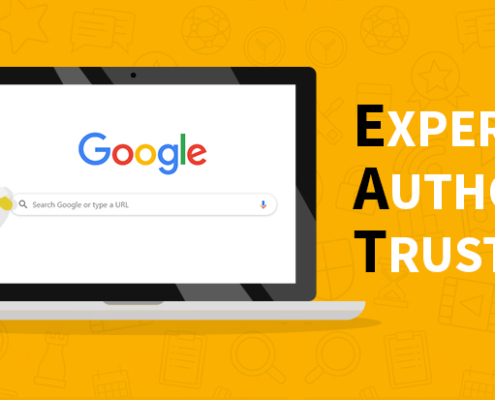WHAT IS E-A-T IN GOOGLE: HOW DOES IT IMPACT SEO
Table of Contents
Google keyword rankings are important if you want to appear at the top of Google search results and gain valuable traffic. In order to achieve this, the most important task is to develop your brand by building trust between consumers and your expertise in what you do.
You may have come across the term EAT, which is already widely used in SEO terms. Google E-A-T has been in the spotlight for the recent years.
This Google ranking principle is not so much of a ranking algorithm, but it did mainly affect websites that offer medical and health advice when it was first released, and then it affected other industries as well. This is why the update is referred to as the “Medic” update.

What is E-A-T?
E-A-T is one of the metrics used by Google to judge the quality of a page, and it stands for Expertise, Authoritativeness and Trustworthiness.
Expertise – A person / website / organisation with a high level of knowledge in a particular field. It indicates that the publisher has shared information about the expertise.
Authoritativeness – Emphasizes the authority and reputation of the publisher and the site itself. It usually refers to the influence of expertise from a particular field, credentials and comments from legitimate users.
Trustworthiness – Shows that the content includes trusted sources of information or the website is trustworthy itself. For example, implementing an SSL certificate on your website helps prove its validity and reassures users that their data is secure.
Google E-A-T has been developed to be a common standard in the search engine industry to measure the quality of content, and content that follows Google’s E-A-T rules will rank well not only in Google, but also in other search engines.
Why is E-A-T important?
E-A-T is an important aspect that Google considers when assessing the credibility of an online source (i.e. publisher, content, website). It helps to differentiate between high quality and low quality websites.
Essentially, a high level of E-A-T means that your website meets the criteria of Google’s Search Quality Evaluator Guidelines (QEG). It helps to differentiate between high and low quality websites. As such, it shows high quality and assures the quality assessor that users can rely on the information you share.
The Google E-A-T determines the various elements necessary for Google’s search engine to judge a website. A good E-A-T will ensure that the quality of your website will improve and so will your ranking.
E-A-T is important for any website, but especially for YMYL (Your Money or Your Life) websites, which are websites that have the potential to influence major life decisions, such as health, finance or safety. This is why Google says in their QEG that they will analyse expertise based on the importance of the site and its content.
Can E-A-T affect rankings?
In general, E-A-T is another way to provide a better user experience on search engines, and this is something that Google is constantly trying to improve. For example, they have developed Core Web Vitals for a faster and smoother user experience.
Expertise, authoritativeness and trustworthiness are human concepts. Therefore, it is difficult for a computer to understand whether a website has a high or low level of E-A-T. This means that E-A-T cannot influence Google’s algorithm itself.
In the sense of measurable metrics, E-A-T is not a part of Google ranking algorithm, but it does impact content rankings.
The E-A-T helps to determine trustworthiness and by gathering feedback from quality assessors, Google can further assess whether a website brings real value to its users. Therefore, following the E-A-T principles helps to create high quality content, which is vital to your Google ranking.
What does E-A-T mean to SEO? Why do you need to include E-A-T in SEO?
E-A-T SEO is primarily related to actionable SEO techniques. Providing high quality content has always been an important part of SEO / WordPress SEO and following the E-A-T guidelines can only benefit it.
Another important measure is link building, choosing high quality links over low quality links. Having more external links from authoritative sites can improve your SEO performance and works well for the authority section of the E-A-T.
In addition, linking to reliable sources will also increase your site’s chances of getting backlinks from authority sites.
Highly weighted referral domains can increase your domain weight and strengthen your backlink profile, which is a must for SEO. The better you are at following and applying E-A-T criteria to your content, the better your chances of visibility and ranking success on organic search engines.
Six ways to improve on E-A-T
Here are 6 specific steps to greatly improve the content on your website and ensure it sends the signals of trust that Google (and users) want to maximise your organic exposure on Google and improve your SEO rankings.
1. Build effective backlinks through off-page SEO
Backlinks from relevant and high authority websites are the backbone of an effective SEO strategy and one of the best ways to prove that you are a trusted authority in your industry.
You must constantly create valuable, unique, high-quality content that people want to link to, positioning yourself as an authority (no matter what the subject). Then, networking with the right publishers and influencers. Those high-value backlinks are sure to follow.
2. Keep your content up to date and accurate
If you want to build authority on these topics, it’s best to keep up with the trends and update your content regularly. As well as applying to these sectors of YMYL, this also applies to general information, regardless of your industry or target audience.
3. Get more mentions from an authoritative source
In addition to backlinks, getting mentions from trusted sources can improve your E-A-T credentials. The more your brand/name appears in authoritative sources on the internet, the more Google will consider you a trusted authority.
In other words, all incoming links from trusted sites – explicit and implicit – are counted in measuring the quality of your pages.
4. Get more comments and respond
As reviews come in, take the time to respond to them – even if they are negative. In fact, if you respond to your feedback, it will boost your credibility as a brand that is both reputable and committed to customer satisfaction.
5. Show your credentials
If your author has certificates, certifications, degrees, or has put in the time necessary to be recognised as an authority in a particular field, your brand has the right to let people (and Google) know about it. You should also link to the author’s website and social accounts to help Google understand the entity behind your content.
6. Use or hire experts
You can improve your site’s E-A-T by working with contributors who have extensive practical experience and credentials to back up their knowledge.







